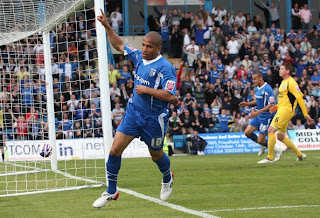
Many of you reading this may not be entirely sure who this young man pictured is. Yes his name may be mentioned within the title, but has anyone actually seen him enough to class him as a footballer they commonly know. How often football fans dismiss the quality of 'lower league' players, and how often we underestimate the heights they can all reach. Three years ago Jackson was ploughing his way through non-league football under the watchful fans of Rushden and Diamonds, but now he's taken gigantic steps into realising his dream of one day becoming one of the best strikers in England.
To give a brief background on him, Jackson is a twenty-two year old Canadian international who was born in Jamaica. He currently plays for Gillingham in Coca-Cola League One, the team who rejected him at the age of 15 after having a trial at the club. After this he remained in England where he had further football trials at Premier League giants Manchester United and Manchester City in 2005. He signed for Gills for a fee of £150,000 in January 2008, and made his senior debut for Canada in 2009, scoring the winner against Cyprus.
Jackson signed with no league experience, and the pressure of the highly expecting Gillingham fans, who had craved for a proven goalscorer since the days of Bob Taylor and Marlon King. Meek efforts from Congan Guylain Ndumbu-Nsungu, Gary Mulligan and Georges Ba had frustrated the Medway faithful, but the arrival of manager Mark Stimson in 2008 and his signing of 'Jacko' has added a new lease of life.
His impressive record at Rushden of 65 goals in 40 games attracted the eyes of many, but it is his ferocity in front of goal in the blue shirt of the Kent side that has alerted bigger clubs such as QPR, Leicester and even Premier League sides Everton, Aston Villa and Tottenham Hotspur.
http://www.thesun.co.uk/sol/homepage/sport/football/2648682/Everton-line-up-super-Simeon.html
Monumental displays in the 2008-09 season, including the 90th winner in the League 2 play-off final against Shrewsbury at Wembley sparked joyous scenes. Jackson also impressed in the play-off semi final against Rochdale where he scored both goals to send Gills through to their 3rd play-off final in their history. In January though, his reputation grew massively with an amazing display of skill and speed to turn Aston Villa's Zat Knight and rocket a shot past the despairing Brad Friedel in the FA Cup.
I was a season ticket holder at Gills for three years, as ticket prices at Chelsea thwarted me from visiting Stamford Bridge on greatly wanted regular occasions. Many players have come, and even more have departed, and I despite my negativity towards the Canadian in his early days at Gills, I've grown to love his natural prowess in front of goal. Given half a chance in front of goal and 9 out of 10 times Jackson would convert it into another goal to add to his ever-increasing tally. I was wrong to judge him so early on, because performances of the highest quality have led me to believe that Jackson can become one of the best in England. For a small man, his heading ability is fantastic, and his control, skill and all round forward play is beyond belief for a 22 year old who has only had one and a half years to grasp the intensity of league football.
Three goals in his first season quickly became 22 in his second, and now third in the 2009-2010 season, Jackson kickstarted his individual campaign with a season opening hat-trick against Swindon, then a further 8 in just 16 games. 11 goals in 16 games is a fair record, and two of these goals came against Championship's Plymouth and the Premier League's Blackburn Rovers.
Is he ready for the step up to the greatest league in the world? Maybe not quite yet, but certainly in the next three years we can expect to see Jackson become a more prominent figure in the Championship, and then the Premier League for sure.
For all you football fans out there, regardless of which team you support, remember the name Simeon Jackson. He has a lot to offer to the game, and anybody interested after reading this blog please do feel free to watch this video from youtube which shows Jacko's first 25 goals for Gillingham Football Club. Enjoy!
http://www.youtube.com/watch?v=Jwe84PKNdMc
G.M






